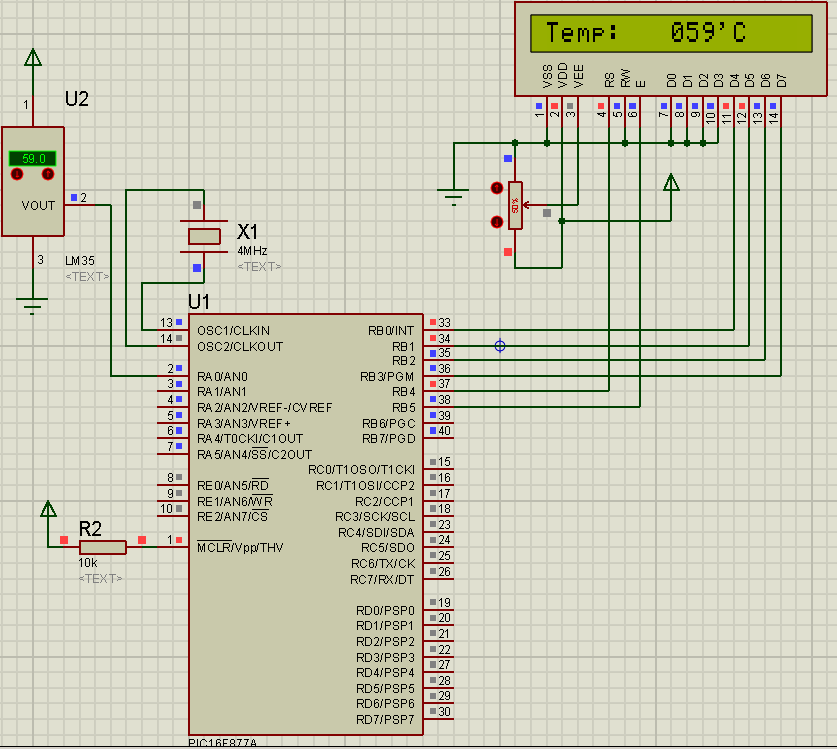Here's one temperature sensor (thermometer) circuit that you can easily build. It uses the popular PIC 16F877A microcontroller. The temperature sensor is LM35. The LM35 outputs an analog voltage proportional to the temperature. The output from the LM35 is 0.1V/'C. So, when temperature sensed is 61'C, the output voltage is 0.61V. This analog voltage is read by the PIC and processed to display the corresponding temperature value on the LCD.
The temperature range for this circuit is 0'C to 150'C.
The analog to digital conversion is done by the PIC ADC module. In the code, I've used the mikroC library function for ADC. You can view the library file here: https://www.mikroe.com/download/eng/documents/compilers/mikroc/pro/pic/help/adc_library.htm
However, you should have a knowledge of how the ADC module works and how to use it. I had written a tutorial on modalities of operation of the PIC 16F877A ADC.
https://www.edaboard.com/blog/1569/
https://www.edaboard.com/blog/1570/
https://www.edaboard.com/blog/1571/
https://www.edaboard.com/blog/1572/
https://www.edaboard.com/blog/1573/
https://www.edaboard.com/blog/1574/
For LCD interfacing, I used the mikroC LCD library. You can view the library file here: https://www.mikroe.com/download/eng/documents/compilers/mikroc/pro/pic/help/lcd_library.htm

Here is the code for PIC16F877A:
(You can download the source file from: https://rapidshare.com/files/3044512089/LM35PIC16F877A.c)
--------------------------------------------------------------------------------------------------------------
//Programmer: Syed Tahmid Mahbub
//Compiler: mikroC PRO for PIC v4.60
//Target PIC: PIC16F877A
--------------------------------------------------------------------------------------------------------------
sbit LCD_RS at RB4_bit;
sbit LCD_EN at RB5_bit;
sbit LCD_D4 at RB0_bit;
sbit LCD_D5 at RB1_bit;
sbit LCD_D6 at RB2_bit;
sbit LCD_D7 at RB3_bit;
sbit LCD_RS_Direction at TRISB4_bit;
sbit LCD_EN_Direction at TRISB5_bit;
sbit LCD_D4_Direction at TRISB0_bit;
sbit LCD_D5_Direction at TRISB1_bit;
sbit LCD_D6_Direction at TRISB2_bit;
sbit LCD_D7_Direction at TRISB3_bit;
unsigned long ADRead;
unsigned int vDisp[3];
unsigned char Display[7];
void main() {
PORTA = 0;
TRISA = 0X01;
PORTB = 0;
TRISB = 0;
LCD_Init();
LCD_Cmd(_LCD_CURSOR_OFF);
LCD_Cmd(_LCD_CLEAR);
LCD_Out(1, 1, "Temp:");
//Display = "+125 'C";
Display[4] = 39; //'
Display[5]= 'C';
ADCON1 = 0x0E;
ADC_Init();
while (1){
ADRead = (ADC_Get_Sample(0) * 500) >> 10;
vDisp[0] = ADRead / 100;
vDisp[1] = (ADRead / 10) % 10;
vDisp[2] = ADRead % 10;
Display[1] = vDisp[0] + 48;
Display[2] = vDisp[1] + 48;
Display[3] = vDisp[2] + 48;
LCD_Chr(1, 8, Display[0]);
LCD_Chr(1, 9, Display[1]);
LCD_Chr(1, 10, Display[2]);
LCD_Chr(1, 11, Display[3]);
LCD_Chr(1, 12, Display[4]);
LCD_Chr(1, 13, Display[5]);
//LCD_Out(1, 8, ); // 'Show temperature
delay_ms(200); //200ms delay for waiting
}
}
The temperature range for this circuit is 0'C to 150'C.
The analog to digital conversion is done by the PIC ADC module. In the code, I've used the mikroC library function for ADC. You can view the library file here: https://www.mikroe.com/download/eng/documents/compilers/mikroc/pro/pic/help/adc_library.htm
However, you should have a knowledge of how the ADC module works and how to use it. I had written a tutorial on modalities of operation of the PIC 16F877A ADC.
https://www.edaboard.com/blog/1569/
https://www.edaboard.com/blog/1570/
https://www.edaboard.com/blog/1571/
https://www.edaboard.com/blog/1572/
https://www.edaboard.com/blog/1573/
https://www.edaboard.com/blog/1574/
For LCD interfacing, I used the mikroC LCD library. You can view the library file here: https://www.mikroe.com/download/eng/documents/compilers/mikroc/pro/pic/help/lcd_library.htm

Here is the code for PIC16F877A:
(You can download the source file from: https://rapidshare.com/files/3044512089/LM35PIC16F877A.c)
--------------------------------------------------------------------------------------------------------------
//Programmer: Syed Tahmid Mahbub
//Compiler: mikroC PRO for PIC v4.60
//Target PIC: PIC16F877A
--------------------------------------------------------------------------------------------------------------
sbit LCD_RS at RB4_bit;
sbit LCD_EN at RB5_bit;
sbit LCD_D4 at RB0_bit;
sbit LCD_D5 at RB1_bit;
sbit LCD_D6 at RB2_bit;
sbit LCD_D7 at RB3_bit;
sbit LCD_RS_Direction at TRISB4_bit;
sbit LCD_EN_Direction at TRISB5_bit;
sbit LCD_D4_Direction at TRISB0_bit;
sbit LCD_D5_Direction at TRISB1_bit;
sbit LCD_D6_Direction at TRISB2_bit;
sbit LCD_D7_Direction at TRISB3_bit;
unsigned long ADRead;
unsigned int vDisp[3];
unsigned char Display[7];
void main() {
PORTA = 0;
TRISA = 0X01;
PORTB = 0;
TRISB = 0;
LCD_Init();
LCD_Cmd(_LCD_CURSOR_OFF);
LCD_Cmd(_LCD_CLEAR);
LCD_Out(1, 1, "Temp:");
//Display = "+125 'C";
Display[4] = 39; //'
Display[5]= 'C';
ADCON1 = 0x0E;
ADC_Init();
while (1){
ADRead = (ADC_Get_Sample(0) * 500) >> 10;
vDisp[0] = ADRead / 100;
vDisp[1] = (ADRead / 10) % 10;
vDisp[2] = ADRead % 10;
Display[1] = vDisp[0] + 48;
Display[2] = vDisp[1] + 48;
Display[3] = vDisp[2] + 48;
LCD_Chr(1, 8, Display[0]);
LCD_Chr(1, 9, Display[1]);
LCD_Chr(1, 10, Display[2]);
LCD_Chr(1, 11, Display[3]);
LCD_Chr(1, 12, Display[4]);
LCD_Chr(1, 13, Display[5]);
//LCD_Out(1, 8, ); // 'Show temperature
delay_ms(200); //200ms delay for waiting
}
}